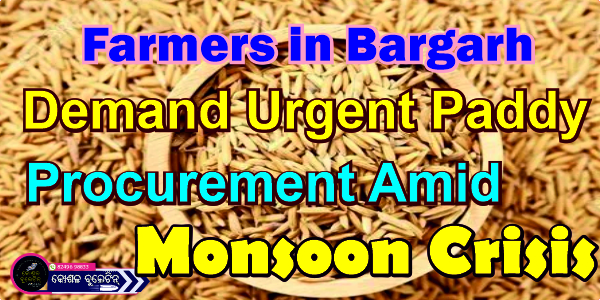In Bargarh, Odisha, known as the state’s “rice bowl,” farmers are grappling with severe challenges in the aftermath of the rabi (winter) paddy procurement season, which concluded recently but left significant unresolved issues. Despite the season’s end, thousands of farmers remain unable to sell their paddy at mandis (market yards), fueling widespread frustration and protests aimed at jolting the district administration into action. Compounding their woes, monsoon rains have already destroyed large quantities of paddy, and the remaining stock faces risks of spoilage due to inadequate storage, either left exposed outside mandis or stored insecurely in farmers’ homes. Allegations of systemic inefficiencies, including paddy being diverted directly to local rice mills through traders with falsified mandi entries, have further eroded trust in the procurement process. Farmers accuse the local administration and public representatives of inaction, leaving them vulnerable to financial losses as the monsoon intensifies.
On June 16, 2025, the Joint Farmer Organisation in Bargarh escalated their grievances by submitting a memorandum to District Collector Aditya Goyal, who was absent, with Additional Collector Madhuchhanda Sahu accepting it on his behalf. The memorandum outlined five critical demands to address the crisis: immediate procurement of all unsold paddy to prevent further losses due to rain, a public notification directing farmers to bring their crops to mandis, provision of safe storage to protect paddy during transit and storage, guaranteed procurement at the Minimum Support Price (MSP) even during heavy rains, and sales through licensed, commission-free mandis with direct lifting by authorized rice mills, including the purchase of rain-damaged paddy at MSP rates. These demands reflect the farmers’ urgent need for systemic intervention to safeguard their livelihoods.
The scale of the issue is stark. Across Odisha, 329,250 farmers registered for the rabi season, with 182,274 having sold 1,154,640 quintals of paddy, leaving 147,777 farmers still awaiting their chance to sell. In Bargarh alone, 91,606 farmers are registered, of whom 66,773 have sold 445,246 quintals, while 24,223 remain unserved. The situation is particularly dire in areas like Barpali block, where approximately 11 lakh bags of paddy are yet to be lifted from mandis, with significant quantities lying exposed in Kumbhari, Tulandi, Agalpur, Bara, Kubedega, Saharatikra, and Tentulitikra. Recent unseasonal rains have already damaged substantial stocks, and the lack of proper storage facilities heightens the risk to the remaining paddy. on June 14, highlight the dire situation at Chandibhata mandi in Jharbandh block, where 6,359 packets of paddy lie exposed under open skies, with only 800 packets safely stored, amplifying farmers’ fears of further losses.
The Joint Farmer Organisation, led by figures like Ramesh Mahapatra, Suresh Nikenti, Niranjan Padhan, Shiv Sahu, Kshirodra Padhan, Sarathi Padhan, Mukesh Sahu, Sudhanshu Biswal, Brindaban Padhan, Kalakara Deheri, Padmalochan Padhan, Purnachandra Padhan, Rajkishor Deheri, Hari Sahu, and Gopinath Sahu, has proposed actionable solutions. They urge the government to issue a public announcement mandating that all unsold paddy be brought to mandis for purchase under MSP rules, ensure secure storage at mandis to prevent spoilage, enforce prompt lifting by authorized commission-free mandis and rice mills, and procure rain-damaged paddy at MSP to eliminate middlemen exploitation. These measures aim to streamline the procurement process and protect farmers from distress sales, which, as noted in a 2021 report, have historically forced farmers to sell at prices as low as Rs 1,000–1,200 per quintal against an MSP of Rs 1,868.
The Odisha government has taken steps to support farmers, notably increasing the MSP to Rs 3,100 per quintal for the 2024-25 rabi season, comprising a base MSP of Rs 2,183 for common paddy (Rs 2,203 for grade-A) plus an Rs 800 input subsidy, fulfilling a key BJP election promise. Launched by Chief Minister Mohan Charan Majhi in Sohela, Bargarh, on December 8, 2024, this initiative aims to ensure farmers receive payments within 48 hours via direct bank transfers. However, as highlighted in a New Indian Express report on June 17, 2025, the procurement system remains plagued by delays, inadequate infrastructure, and middlemen influence, with farmers alleging that millers threaten deductions of 2–3 kg per quintal even for clean, dry paddy. Earlier protests, such as one on April 27, 2025, saw farmers demand procurement begin on May 1 instead of May 14, citing insufficient mandi facilities and lack of farmer representation in district-level procurement committees.
The farmers’ agitation, backed by organizations like Sanjukta Krushak Sangathan and Jay Kisan Andolan, has intensified, with threats of further protests if demands are not met. A December 27, 2024, dharna outside the collector’s office saw farmers give a three-day ultimatum for paddy lifting, threatening to dump bags at the collectorate if unmet. Collector Goyal has promised measures like shaded waiting areas, ORS stocking at mandis, and a toll-free number (1967 or 06646-246041) for complaints against millers or officials, with action assured within 48 hours. However, core issues—token shortages, gunny bag deficits, miller deductions, and middlemen dominance—persist, undermining these efforts.
The crisis in Bargarh reflects broader procurement challenges across Odisha, where nearly 150,000 farmers await sales. With the monsoon exacerbating crop spoilage risks, farmers’ anxiety is palpable. June 14 report of 30,000 bags lying exposed at Kumbhari mandi, sparking discontent. The Joint Farmer Organisation’s demands underscore the need for urgent government intervention to ensure fair, timely procurement and protect farmers from further losses, highlighting systemic flaws that require immediate reform to safeguard Odisha’s agrarian economy.




